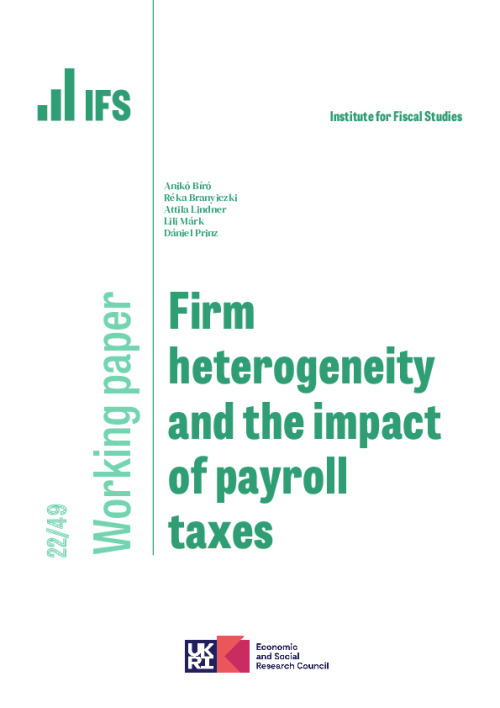Downloads
We study the impact of a large payroll tax cut for older workers in Hungary. Motivated by the predictions of a standard equilibrium job search model, we examine the heterogeneous impact of the policy. Employment increases most at low-productivity firms offering low-wage jobs, which tend to hire from unemployment, while the effects are more muted for high-productivity firms offering high-wage jobs. At the same time, wages only increase at high-productivity firms. These results point to important heterogeneity in the incidence of payroll tax cuts across firms and highlight that payroll taxes have a significant impact on the composition of jobs in the labor market.
Authors

Research Associate
Anikó is a Research Associate at the IFS and a senior researcher at the Institute of Economics, Centre for Economic and Regional Studies in Budapest.
Réka Branyiczki

Research Fellow University College London
Attila is an IFS Research Fellow, an Associate Professor of Economics at the University College London and Adjust Professor at the University of Oslo.
Lili Márk

Research Associate World Bank
Daniel is an economist at the World Bank. His research covers topics in public finance, including social insurance, taxation, and inequality.
Working Paper details
- DOI
- 10.1920/wp.ifs.2022.4922
- Publisher
- Institute for Fiscal Studies
Suggested citation
Branyiczki, R et al. (2022). Firm heterogeneity and the impact of payroll taxes. 22/49. London: Institute for Fiscal Studies. Available at: https://ifs.org.uk/publications/firm-heterogeneity-and-impact-payroll-taxes (accessed: 27 April 2024).
More from IFS
Understand this issue

Spring Budget 2024: What you need to know
7 March 2024

If you can’t see it, you can’t be it: role models influence female junior doctors’ choice of medical specialty
24 April 2024

The £600 billion problem awaiting the next government
25 April 2024
Policy analysis

Recent trends in public sector pay
26 March 2024

Progression of nurses within the NHS
12 April 2024

Regional variation in earnings and the retention of NHS staff in Agenda for Change bands 1 to 4
10 April 2024
Academic research

Labour market inequality and the changing life cycle profile of male and female wages
15 April 2024

Interpreting cohort profiles of lifecycle earnings volatility
15 April 2024

There and back again: women’s marginal commuting costs
2 April 2024
